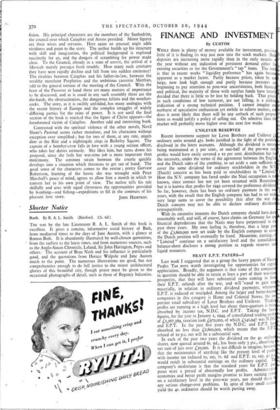FINANCE AND INVESTMEN T
By CUSTOS
WHILE there is plenty of money available for investment, pr cio little of it is finding its way just now into the stock markets. B. deposits are increasing more rapidly than in the early months the year without any indication of persistent demand either 1.1 existing securities or for the Government's " tap " loans. The tru is that in recent weeks " liquidity preference" has again
ar
apparent as a market factor. ' Partly because prices, taken by large, now look high enough and partly because investors , beginning to pay attention to post-war uncertainties, both finan :
and political, the majority of those with surplus funds have 1 tterl decided that there is little to be lost by holding back. That price in such conditions of low turnover, are not falling, is a strikin indication of a strong technical position. I cannot imagine an outburst of speculative enthusiasm yet awhile to relieve matters, no does it seem likely that there will be any setback of such propor e tions as would jutify a policy of selling out. On selective lines th. market will probably move higher over the next few weeks
UNILEVER RESERVES
Recent investment support for Lever Brothers and Unilever £ ordinary units around 45s. looks justified in the light of the positio disclosed in the latest accounts. Although the dividend is merel being maintained at 5 per cent., or one-half of the pre-war rat profits would have easily covered a so per cent. distribution but f• the necessity, under the terms of the agreement between the E and the Dutch sides of the combine, to set aside a sum sufficient. t cover the same dividend for ordinary stockholders in the N. (Dutch) concern as has been paid to stockholders in "Limited, How the N.V. company has fared under the Nazi occupation is n' known, since contact has not yet been resumed with Rotte da but it is known that profits for 1942 covered the preference divi enc
So far, however, there has been no ordinary payment in the w
years, with the result that the English company has had to set asid very large sums to cover the possibility that after the war th c Dutch concern may not be able to declare ordinary divi en• e retrospectively. With its extensive interests the Dutch company should have don reasonably well, and will, of course, have claims on Germany for an financial depredations that the Nazis may have perpetrated in th past three years. My own feeling is, therefore, that a large pa of the £3,600,000 now set aside by the English company to cove the Dutch position will eventually be freed. Meantime, earnings o " Limited " continue on a satisfactory level and the consolidate• balance-sheet discloses a strong position as regards reserves a ■ liquid resources.
HEAVY E.P.T. PAYERS—I
appreciation. Broadly, the argument is that some of the comp ni in question should be able to retain at least a part of their war-ti prosperity, that they will have substantial sums coming in fri Profits Tax were worth investigating for opportunities for capit their E.P.T. refunds after the war, and will 'stand to gain ye Last week I suggested that as a group the heavy payers of E cet materially, in relation to ordinary dividend payments, whenev. E.P.T. is reduced or rescinded. Among the larger and better-kno companies in this category is Home and Colonial Stores, the in portant retail subsidiary of Lever Brothers and Unilever. Tradin profits are running at a high level but about three-quarters is bein absorbed by income tax, N.D.C. and E.P.T. Taking the lates Ix figures, for the year to January it, 1944, of consolidated trading profi la of L1,267,369, taxation took £97o,000, of which £441,947 was N.D., and E.P.T. In the past five years the N.D.C. and E.P.T. hat absorbed no less than £2,600,000, which means that the E.P. refund of so p.c. net will be a substantial sum.
In each of the past two years the dividend on the 45. ordin.
shares, now quoted around 6s. 9d., has been only 3 p:c., absorbing net sum of just over £3o,000. It is not difficult to imagine, hOwel' that the maintenance of anything like the present level of profi with income tax reduced to, say, 7s. 6d and E.P.T. to, say, 40 P. would result in substantial earnings on the ordinary capital. company's misfortune is that the standard years for E.P.T. pur poses were a period of abnormally low profits. Administrati economies and better profit margins promise to leave earning pow' on a satisfactory level in the post-war years, nor should there any serious change-over problems. In spite of their small curre, yield the 4s. ordinaries should be worth putting away.


























 Previous page
Previous page